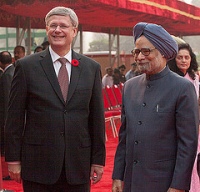The prime ministers of Canada and India have finalised a deal that will allow a nuclear cooperation agreement signed over two years ago to be implemented, opening the door for trade worth millions of dollars between the two countries.
 |
| PMs Harper and Singh in India (Image: Office of the Prime Minister) |
Canadian prime minister Stephen Harper and Indian Prime Minister Manmohan Singh announced the conclusion of negotiations on the administrative agreement, through which the 2010 nuclear cooperation agreement will be implemented, during a visit by Harper to India. Together, the two agreements will allow Canadian firms to export and import controlled nuclear materials, equipment and technology to and from India to facilities which are under International Atomic Energy Agency (IAEA) safeguards. The cooperation agreement provides assurances that Canadian-origin nuclear material, equipment and technology will only be used for civilian and peaceful applications.
India, which has ambitious nuclear energy expansion plans but limited uranium resources, represents a vast potential market for Canada's uranium. However, its nuclear weapons program and its status outside the international Nuclear Non-Proliferation Treaty (NPT) effectively isolated India from international nuclear trade for over three decades, until an agreement with the Nuclear Suppliers Group in September 2008 exempted it from prohibition. Although not a signatory of the NPT, India now has its own safeguards agreement with the IAEA.
In a joint statement, the two prime ministers reiterated their shared commitment to a world without nuclear weapons and reaffirmed their support for global non-proliferation efforts. Canada acknowledged India's strong non-proliferation credentials and expressed support for India's ongoing engagement with multilateral export control regimes.
In the same statement, Singh and Harper also recognised that "Canada, with its large and high-quality reserves of uranium, could become an important supplier to India's nuclear power program". Harper went on to say that he expected that the arrangement would generate billions of dollars in new business contracts and generate employment opportunities in Canada.
The agreement will establish a new Canadian-Indian joint committee to ensure ongoing discussions and information sharing, covering areas including research and development, safety, and next generation nuclear facilities. The agreement will also ensure that Canada receives assurances that any exports to India are used for peaceful purposes.
The administrative agreement must now be formally signed by the Canadian Nuclear Safety Commission (CNSC) and India’s Department of Atomic Energy, after which the two governments will be able to bring the nuclear cooperation into force. CNSC president Michael Binder expressed his delight at the successful conclusion of negotiation, which he described as an important milestone.
Brad Wall, premier of the Canadian province of Sasketchewan where the country's uranium production is centred, also applauded his prime minister for the deal. "This is great news for Saskatchewan and our robust uranium industry," he said, describing Saskatchewan's uranium producers as "excited and ready" to supply uranium to India.
Researched and written
by World Nuclear News





_63865.jpg)
_18570.jpg)
_16159.jpg)





